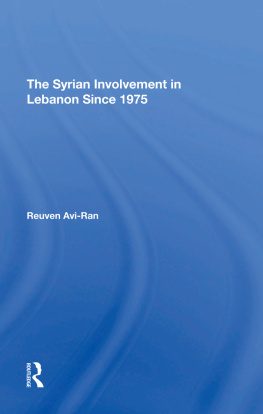Letter dated 24 March 2005 from the Secretary-General to the President of the Security Council
Table of Contents
I have the honour to transmit herewith the report of the Mission of Inquiry into the Circumstances, Causes and Consequences of the 14 February Beirut Bombing, which was prepared pursuant to the statement by the President of the Security Council (S/PRST/2005/4) of 15 February 2005.
This independently conducted fact-finding report presented to the Council today raises some very serious and troubling allegations. The Mission concludes that an independent international investigation is needed.
I endorse the Missions recommendation that such an investigation be established. The aim would be to reach conclusions as complete as possible about who was responsible for the assassination of Mr. Hariri and the deaths of 19 others.
I wish to thank Mr. Peter FitzGerald, head of the Mission, and the members of his team, for producing the report.
I should be grateful if you would bring this matter to the attention of the members of the Council. Meanwhile, I am also transmitting the report to the Government of Lebanon.
Lebanon is passing through a difficult and sensitive period. It is imperative that all concerned should behave with the utmost restraint. The future of Lebanon should be decided strictly through peaceful means.
(Signed) Kofi A. Annan
Report of the Fact-finding Mission to Lebanon inquiring into the causes, circumstances and consequences of the assassination of former Prime Minister Rafik Hariri
(25 February-24 March 2005)
Executive summary
Table of Contents
On 14 February 2005, an explosion in downtown Beirut killed 20 persons, among them the former Prime Minister, Rafik Hariri. The United Nations Secretary General dispatched a Fact-finding Mission to Beirut to inquire into the causes, the circumstances and the consequences of this assassination. Following its arrival in Beirut on 25 February, the Mission met with a large number of Lebanese officials and representatives of different political groups, performed a thorough review of the Lebanese investigation and legal proceedings, examined the crime scene and the evidence collected by the local police, collected and analysed samples from the crime scene, and interviewed some witnesses in relation to the crime.
The specific "causes" of the assassination of Mr. Hariri cannot be reliably asserted until after the perpetrators of this crime are brought to justice. However, it is clear that the assassination took place in a political and security context marked by acute polarization around the Syrian influence in Lebanon and the failure of the Lebanese State to provide adequate protection for its citizens.
Regarding the circumstances, the Mission is of the view that the explosion was caused by a trinitrotoluene (TNT) charge of about 1,000 kilograms placed most likely above the ground. The review of the investigation indicates that there was a distinct lack of commitment on the part of the Lebanese authorities to investigating the crime effectively, and that this investigation was not carried out in accordance with acceptable international standards. The Mission is also of the view that the Lebanese investigation lacks the confidence of the population necessary for its results to be accepted.
The consequences of the assassination could be far-reaching. It seems to have unlocked the gates of political upheavals that were simmering throughout the last year. Accusations and counter-accusations are rife and aggravate the ongoing political polarization. Some accuse the Syrian security services and leadership of assassinating Mr. Hariri because he became an insurmountable obstacle to their influence in Lebanon. Syrian supporters maintain that he was assassinated by "the enemies of Syria"; those who wanted to create international pressure on the Syrian leadership in order to accelerate the demise of its influence in Lebanon and/or start a chain of reactions that would eventually force a "regime change" inside the Syrian Arab Republic itself. Lebanese politicians from different backgrounds expressed to the Mission their fear that Lebanon could be caught in a possible showdown between the Syrian Arab Republic and the international community, with devastating consequences for Lebanese peace and security.
After gathering the available facts, the Mission concluded that the Lebanese security services and the Syrian Military Intelligence bear the primary responsibility for the lack of security, protection, and law and order in Lebanon. The Lebanese security services have demonstrated serious and systematic negligence in carrying out the duties usually performed by a professional national security apparatus. In doing so, they have severely failed to provide the citizens of Lebanon with an acceptable level of security and have therefore contributed to the propagation of a culture of intimidation and impunity. The Syrian Military Intelligence shares this responsibility to the extent of its involvement in running the security services in Lebanon.
It is also the Missions conclusion that the Government of the Syrian Arab Republic bears primary responsibility for the political tension that preceded the assassination of the former Prime Minister, Mr. Hariri. The Government of the Syrian Arab Republic clearly exerted influence that went beyond the reasonable exercise of cooperative or neighbourly relations. It interfered with the details of governance in Lebanon in a heavy-handed and inflexible manner that was the primary reason for the political polarization that ensued. Without prejudice to the results of the investigation, it is obvious that this atmosphere provided the backdrop for the assassination of Mr. Hariri.
It became clear to the Mission that the Lebanese investigation process suffers from serious flaws and has neither the capacity nor the commitment to reach a satisfactory and credible conclusion. To uncover the truth, it would be necessary to entrust the investigation to an international independent commission, comprising the different fields of expertise that are usually involved in carrying out similarly large investigations in national systems, with the necessary executive authority to carry out interrogations, searches and other relevant tasks. Furthermore, it is more than doubtful that such an international commission could carry out its tasks satisfactorilyand receive the necessary active cooperation from local authoritieswhile the current leadership of the Lebanese security services remains in office.
It is the Missions conclusion that the restoration of the integrity and credibility of the Lebanese security apparatus is of vital importance to the security and stability of the country. A sustained effort to restructure, reform and retrain the Lebanese security services will be necessary to achieve this end, and will certainly require assistance and active engagement on the part of the international community.
Finally, it is the Missions view that international and regional political support will be necessary to safeguard Lebanons national unity and to shield its fragile polity from unwarranted pressure. Improving the prospects of peace and security in the region would offer a more solid ground for restoring normalcy in Lebanon.














